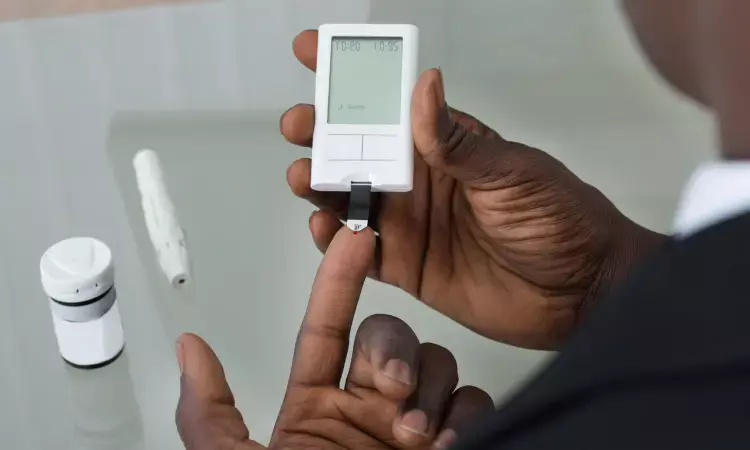- Home
- Medical news & Guidelines
- Anesthesiology
- Cardiology and CTVS
- Critical Care
- Dentistry
- Dermatology
- Diabetes and Endocrinology
- ENT
- Gastroenterology
- Medicine
- Nephrology
- Neurology
- Obstretics-Gynaecology
- Oncology
- Ophthalmology
- Orthopaedics
- Pediatrics-Neonatology
- Psychiatry
- Pulmonology
- Radiology
- Surgery
- Urology
- Laboratory Medicine
- Diet
- Nursing
- Paramedical
- Physiotherapy
- Health news
- Fact Check
- Bone Health Fact Check
- Brain Health Fact Check
- Cancer Related Fact Check
- Child Care Fact Check
- Dental and oral health fact check
- Diabetes and metabolic health fact check
- Diet and Nutrition Fact Check
- Eye and ENT Care Fact Check
- Fitness fact check
- Gut health fact check
- Heart health fact check
- Kidney health fact check
- Medical education fact check
- Men's health fact check
- Respiratory fact check
- Skin and hair care fact check
- Vaccine and Immunization fact check
- Women's health fact check
- AYUSH
- State News
- Andaman and Nicobar Islands
- Andhra Pradesh
- Arunachal Pradesh
- Assam
- Bihar
- Chandigarh
- Chattisgarh
- Dadra and Nagar Haveli
- Daman and Diu
- Delhi
- Goa
- Gujarat
- Haryana
- Himachal Pradesh
- Jammu & Kashmir
- Jharkhand
- Karnataka
- Kerala
- Ladakh
- Lakshadweep
- Madhya Pradesh
- Maharashtra
- Manipur
- Meghalaya
- Mizoram
- Nagaland
- Odisha
- Puducherry
- Punjab
- Rajasthan
- Sikkim
- Tamil Nadu
- Telangana
- Tripura
- Uttar Pradesh
- Uttrakhand
- West Bengal
- Medical Education
- Industry
Doxepin induced postprandial hypoglycemia in nondiabetic patient: Case Report

USA: A case report published in a medical journal The Primary Care Companion to CNS Disorders by Hiba Z. Hashmi and colleagues highlights the potential association between doxepin, a tricyclic antidepressant, and postprandial hypoglycemia in an otherwise healthy individual.
The report underscores the importance of recognizing the impact of antidepressant medications on glucose regulation and the potential risks associated with hypoglycemic episodes.
The case involved a 43-year-old man with a history of posttraumatic stress disorder who presented with symptoms of hypoglycemia, such as confusion, diaphoresis, and tremulousness, occurring two hours after consuming foods high in simple carbohydrates. The patient's symptoms had been present for many years but had worsened over the past 1 to 2 years, significantly interfering with his daily life. The individual was taking citalopram 20 mg/day since 2007 and doxepin 50 mg/day since 2015.
- To investigate the potential link between doxepin and hypoglycemia, the patient's psychiatrist discontinued doxepin.
- Laboratory tests, including fasting glucose levels and a mixed meal test (59 g carbohydrates, 15 g fat, 22 g protein), were conducted.
- The results were within normal limits, ruling out other causes of hypoglycemia.
- A continuous glucose monitor (CGM) was used to track the patient's glucose levels.
- During the week without doxepin, the patient remained asymptomatic, while symptoms recurred upon reintroduction of the medication.
- The CGM data showed a decrease in mean glucose levels by 6.9 mg/dL during doxepin therapy.
While antidepressant drugs have occasionally been associated with glucose dysregulation, including both hypoglycemia and hyperglycemia, the majority of reported cases involve individuals with type 2 diabetes taking antihyperglycemic medications. Among tricyclic antidepressants, including doxepin, rare hypoglycemic events have been reported. However, this case is the first known instance of postprandial hypoglycemia caused by doxepin in an otherwise healthy individual.
Studies have shown that doxepin can enhance insulin action and increase insulin sensitivity, leading to hypoglycemia in animal models. Chronic doxepin use has been associated with profound hypoglycemia, while acute administration resulted in significant hypoglycemia in fasted animals. However, the effects of doxepin on glucose regulation can vary.
It is crucial for healthcare professionals to be aware of the potential impact of antidepressants, including doxepin, on glucose regulation. Hypoglycemic episodes can have adverse effects on mental health, and in severe cases, they can be life-threatening. Recognizing and monitoring for symptoms of hypoglycemia in individuals taking doxepin or other antidepressants is important to ensure appropriate management and minimize the risks associated with glucose dysregulation.
Further research is needed to better understand the mechanisms by which doxepin and other antidepressants affect glucose metabolism and to identify individuals who may be more susceptible to these effects.
Reference:
Hashmi, H. Z., Kaur, J., Stout, S. C., & Drake, T. (2023). Doxepin-associated hypoglycemia in an ambulatory nondiabetic patient. The Primary Care Companion to CNS Disorders, 25(4). https://doi.org/10.4088/PCC.22cr03367
Dr Kamal Kant Kohli-MBBS, DTCD- a chest specialist with more than 30 years of practice and a flair for writing clinical articles, Dr Kamal Kant Kohli joined Medical Dialogues as a Chief Editor of Medical News. Besides writing articles, as an editor, he proofreads and verifies all the medical content published on Medical Dialogues including those coming from journals, studies,medical conferences,guidelines etc. Email: drkohli@medicaldialogues.in. Contact no. 011-43720751


